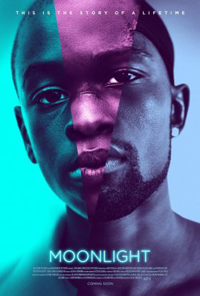 Moonlight (2016)
Moonlight (2016)
This second feature film by the writer-director Barry Jenkins premiered at the Telluride Film Festival in September 2016, and then released nationwide two months later. Since then, reviews, both popular and professional, have been off the charts. The Tomatometer, for example, clicks in at 98%. The power of the film rests in its ability to make us empathize at a deeply human level with a protagonist with whom we have almost nothing in common. Chiron is black and gay. He's from a rough neighborhood in Miami, and has a mother who's a crackhead. His only male role model, and it's a positive influence, is a dope dealer named Juan. School is a place of physical and emotional abuse. Chiron is a deeply withdrawn little boy trying to figure out who he is and where he fits in the world. He asks Juan, "What's a faggot? Am I a faggot?" The movie shows three snapshots in his life — as a little boy, as a lanky teenager, and then as an adult. At the end of the film when Chiron re-connects with his best friend Kevin after many years apart, the latter asks him, "Man, who is you?! That car, and those gold fronts on your teeth! You ain't what I expected!" You can watch this film as an exploration of black male identity (there are no white actors), but at a deeper level, I appreciated the observation of A.O. Scott that "every moment [of the movie] is infused with what the poet Hart Crane called 'infinite consanguinity,' the mysterious bond that links us with one another" — experienced, to take four examples from the film, in the feel of an ocean breeze, learning to float on your back in water, the ability of music to evoke memories, and the formative power of geographic place. There are many and good reasons why a lot of viewers are calling "Moonlight" the movie of the year for 2016.


